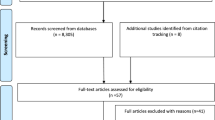Abstract
Introduction To develop and implement effective oral care interventions for patients after stroke, there is a need to understand the causes behind the decline in their oral health. This qualitative study was, therefore, undertaken to explore experiences and views of health service providers about the causes of oral health decline in this group of patients.
Methods A purposively selected sample of healthcare service providers who work in two NHS Trusts in the North of England were interviewed utilising a semi-structured interview technique. Interviews were conducted with the assistance of a topic guide and continued until data saturation (n = 30) was reached. The constant comparative approach was used to analyse the data.
Results Two major factors, perceived by the participants, were thought to cause oral health decline in patients after stroke. Post-stroke neurological deficits resulting in oral-related functional disturbances was the first. The second was the barriers leading to difficulties in performing or receiving daily oral care. These barriers were related to the patients, their service providers, or the environment in which care is being delivered.
Conclusions This study described the major factors affecting the oral health of patients after stroke, which can offer a starting point for developing effective oral care interventions for them.
Key points
-
Explores experiences and views of health service providers about the causes of oral health decline in patients after stroke.
-
Identifies post-stroke neurological deficits that can affect oral-related functions.
-
Discusses barriers to oral care in patients after stroke.
This is a preview of subscription content, access via your institution
Access options
Subscribe to this journal
Receive 24 print issues and online access
$259.00 per year
only $10.79 per issue
Buy this article
- Purchase on Springer Link
- Instant access to full article PDF
Prices may be subject to local taxes which are calculated during checkout
Similar content being viewed by others
References
Kothari M, Pillai R S, Kothari S F, Spin-Neto R, Kumar A, Nielsen J F. Oral health status in patients with acquired brain injury: a systematic review. Oral Surg Oral Med Oral Pathol Oral Radiol 2017; 123: 205-219.
Schimmel M, Ono T, Lam O L, Müller F. Oro-facial impairment in stroke patients. J Oral Rehabil 2017; 44: 313-326.
Costa Mendes L, Vaysse F, Maret D. Brain Abscess Secondary to a Dental Infection. Case Rep Emerg Med 2020; 2020: 3248174.
Fiehn N-E, Gutschik E, Larsen T, Bangsborg J M. Identity of streptococcal blood isolates and oral isolates from two patients with infective endocarditis. J Clin Microbiol 1995; 33: 1399-1401.
Scannapieco F A, Cantos A. Oral inflammation and infection, and chronic medical diseases: implications for the elderly. Periodontol 2000 2016; 72: 153-175.
Sheiham A. Oral health, general health and quality of life. Bull World Health Organ 2005; 83: 644.
Lyons M, Smith C, Boaden E et al. Oral care after stroke: Where are we now? Eur Stroke J 2018; 3: 347-354.
Horne M, McCracken G, Walls A, Tyrrell P J, Smith C J. Organisation, practice and experiences of mouth hygiene in stroke unit care: A mixed-methods study. J Clin Nurs 2015; 24: 728-738.
Corbin J, Strauss A. Basics of Qualitative Research: Techniques and Procedures for Developing Grounded Theory. 4th ed. California: SAGE Publications, 2014.
Martino R, Foley N, Bhogal S, Diamant N, Speechley M, Teasell R. Dysphagia after stroke: incidence, diagnosis, and pulmonary complications. Stroke 2005; 36: 2756-2763.
Dai R, Lam O L, Lo E C, Li L S, Wen Y, McGrath C. Orofacial functional impairments among patients following stroke: a systematic review. Oral Dis 2015; 21: 836-849.
Pedersen P M, Vinter K, Olsen T S. Aphasia after stroke: type, severity and prognosis: The Copenhagen aphasia study. Cerebrovasc Dis 2004; 17: 35-43.
Kim I S, Han T R. Influence of mastication and salivation on swallowing in stroke patients. Arch Phys Med Rehabil 2005; 86: 1986-1990.
Schimmel M, Leemann B, Herrmann F R, Kiliaridis S, Schnider A, Müller F. Masticatory function and bite force in stroke patients. J Dent Res 2011; 90: 230-234.
Foley N C, Martin R E, Salter K L, Teasell R W. A review of the relationship between dysphagia and malnutrition following stroke. J Rehabil Med 2009; 41: 707-713.
Konaka K, Kondo J, Hirota N et al. Relationship between tongue pressure and dysphagia in stroke patients. Eur Neurol 2010; 64: 101-107.
Singer J, Conigliaro A, Spina E, Law S W, Levine S R. Central poststroke pain: A systematic review. Int J Stroke 2017; 12: 343-355.
Delpont B, Blanc C, Osseby G V, Hervieu-Bègue M, Giroud M, Béjot Y. Pain after stroke: A review. Rev Neurol (Paris) 2018; 174: 671-674.
Harrison R A, Field T S. Post stroke pain: Identification, assessment, and therapy. Cerebrovasc Dis 2015; 39: 190-201.
Do Carmo J F, Morelato R L, Pinto H P, de Oliveira E R. Disability after stroke: a systematic review. Fisioterapia em Movimento 2015; 28: 407-418.
Ajwani S, Jayanti S, Burkolter N et al. Integrated oral health care for stroke patients - a scoping review. J Clin Nurs 2017; 26: 891-901.
Parton A, Malhotra P, Husain M. Hemispatial neglect. J Neurol Neurosurg Psychiatry 2004; 75: 13-21.
Nijboer T, van de Port I, Schepers V, Post M, Visser-Meily A. Predicting functional outcome after stroke: the influence of neglect on basic activities in daily living. Front Hum Neurosci 2013; 7: 182.
Vanbellingen T, Ottiger B, Maaijwee N et al. Spatial Neglect Predicts Upper Limb Use in the Activities of Daily Living. Cerebrovasc Dis 2017; 44: 122-127.
Fujihara I, Sadamori S, Abekura H, Akagawa Y. Relationship between behavioural and psychological symptoms of dementia and oral health status in the elderly with vascular dementia. Gerodontology 2013; 30: 157-161.
Niesten D, van Mourik K, van der Sanden W. The impact of frailty on oral care behaviour of older people: a qualitative study. BMC Oral Health 2013; 13: 61.
Tham R, Hardy S. Oral healthcare issues in rural residential aged care services in Victoria, Australia. Gerodontology 2013; 30: 126-132.
Niesten D, Van Mourik K, van der Sanden W. The impact of having natural teeth on the QoL of frail dentulous older people. A qualitative study. BMC Public Health 2012; 12: 839.
Ågård A S, Egerod I, Tønnesen E, Lomborg K. Struggling for independence: a grounded theory study on convalescence of ICU survivors 12 months post ICU discharge. Intensive Crit Care Nurs 2012; 28: 105-113.
Lykkegaard K, Delmar C. A threat to the understanding of oneself: Intensive care patients' experiences of dependency. Int J Qual Stud Health Well-being 2013; 8: 20934.
Stone J, Townend E, Kwan J, Haga K, Dennis M S, Sharpe M. Personality change after stroke: some preliminary observations. J Neurol Neurosurg Psychiatry 2004; 75: 1708-1713.
Kim J S. Post-stroke Mood and Emotional Disturbances: Pharmacological Therapy Based on Mechanisms. J Stroke 2016; 18: 244-255.
Ab Malik N, Mohamad Yatim S, Hussein N, Mohamad H, McGrath C. Oral hygiene practices and knowledge among stroke-care nurses: A multicentre cross-sectional study. J Clin Nurs 2018; 27: 1913-1919.
Göstemeyer G, Baker S R, Schwendicke F. Barriers and facilitators for provision of oral health care in dependent older people: a systematic review. Clin Oral Investig 2019; 23: 979-993.
Yeung K Y, Chui Y Y. An exploration of factors affecting Hong Kong ICU nurses in providing oral care. J Clin Nurs 2010; 19: 3063-3072.
De Visschere L, de Baat C, De Meyer L et al. The integration of oral health care into day-to-day care in nursing homes: A qualitative study. Gerodontology 2015; 32: 115-122.
Hilton S, Sheppard J J, Hemsley B. Feasibility of implementing oral health guidelines in residential care settings: Views of nursing staff and residential care workers. Appl Nurs Res 2016; 30: 194-203.
Taverna M V, Nguyen C, Wright R, Tysinger J W, Sorenson H M. Iatro-compliance: an unintended consequence of excessive autonomy in long term care facilities. J Dent Hyg 2014; 88: 53-60.
Unfer B, Braun K O, de Oliveira Ferreira A C, Ruat G R, Batista A K. Challenges and barriers to quality oral care as perceived by caregivers in long-stay institutions in Brazil. Gerodontology 2012; 29: 324-330.
Boyd H, McKernon S, Mullin B, Old A. Improving healthcare through the use of co-design. N Z Med J 2012; 125: 76-87.
Eyles H, Jull A, Dobson R et al. Co-design of mHealth delivered interventions: a systematic review to assess key methods and processes. Curr Nutr Rep 2016; 5: 160-167.
O'Brien N, Heaven B, Teal G et al. Integrating Evidence From Systematic Reviews, Qualitative Research, and Expert Knowledge Using Co-Design Techniques to Develop a Web-Based Intervention for People in the Retirement Transition. J Med Internet Res 2016; 18: 210.
Bate P, Robert G. Bringing User Experience to Healthcare Improvement: The Concepts, Methods and Practices of Experience-Based Design. Abingdon: Radcliffe Publishing, 2007.
BaHammam F A. Investigation of Oral Health Assessment Measures for the Care Planning of Dependent Adults. Newcastle: Newcastle University, 2021. PhD Thesis.
Acknowledgements
The current work is based on work detailed within the first author's PhD thesis, submitted to Newcastle University, funded from the bench fees of PhD at School of Dental Sciences, Newcastle University, provided by Saudi Arabian Cultural Bureau in London.
Author information
Authors and Affiliations
Contributions
Fahad BaHammam contributed to conception, design, data acquisition and interpretation, drafted and critically revised the manuscript. Justin Durham, Bana Abdulmohsen, Rebecca Wassall and Giles I. McCracken contributed to conception, design, data interpretation, and critically revised the manuscript.
Corresponding author
Ethics declarations
The authors declare no conflicts of interest.
Ethical approval before executing the study was granted by the Faculty of Medical Sciences Ethics Committee at Newcastle University, UK (FMS-EC 1609/6994/2018). Written informed consent was obtained before participant interviews.
The data that support the findings of this study are available from the corresponding author upon reasonable request.
Rights and permissions
Springer Nature or its licensor (e.g. a society or other partner) holds exclusive rights to this article under a publishing agreement with the author(s) or other rightsholder(s); author self-archiving of the accepted manuscript version of this article is solely governed by the terms of such publishing agreement and applicable law.
About this article
Cite this article
BaHammam, F., Durham, J., Abdulmohsen, B. et al. Oral health decline in patients after stroke: a qualitative study. Br Dent J 235, 881–885 (2023). https://doi.org/10.1038/s41415-023-6558-2
Received:
Revised:
Accepted:
Published:
Issue Date:
DOI: https://doi.org/10.1038/s41415-023-6558-2



